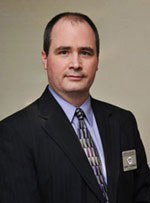Chaplain's PageHistory and Ministry of Chaplains:According to legend, when St. Martin of Tours (c. 335-397 AD) was serving as a soldier in the Roman army, he came across a beggar on a cold night. As the story goes, Martin of Tours, moved by compassion, cut apart his military cloak and gave the poor beggar, who was freezing from the cold, half. Sometime later, he met Jesus, who returned the cloak, stating that Martin of Tours had clothed him with his robe. The incident resulted in Martin of Tours' conversion and his commitment to the Church (later becoming Bishop of Tours). However, the cloak came to symbolize the compassion shown by Martin of Tours toward those in need. It is said that the cloak, a religious relic, was carried into battle by kings - kings who also had their own personal clergy to attend to their needs. "Cloak" in Latin is "cappella" (the plural is "cappellani"), and priests were the keepers and protectors of relics. In time, those priests became known as "keepers of the cloak" (or "cappellanus"). The word "chaplain" comes from the French translation of the Latin. Thus, chaplains were ministers who ministered to those outside the four walls of the church, and there are thousands who minister (i.e. serve) outside of a traditional church or chapel (or synagogue, etc.). Even though chaplains generally come from a particular religious background, they minister to those from all faiths through a ministry of service. While they are experts on their religious faiths, their goal is not to convert those to whom they minister to the faith of the chaplain. While groups often choose a chaplain who best represents the majority of their memberships, it is not unheard of to see, for example, a Muslim chaplain ministering to a Christian or vice versa. Chaplains' duties vary from organization to organization, but in general they are available as experts in religious matters, provide spiritual counsel; are expert "listeners" when someone needs another to talk to in confidence; serve on review boards awards committees, etc.; provide general assistance when called upon; offer prayers on special occasions, award ceremonies, banquets, etc.; teach on topics of stress, crisis management, etc.; and anything else the organization for which they serve requests. Chaplains' backgrounds vary, and some have skills and training others do not, so an exhaustive list is not possible. Benefits and Causes Committee:For a number of years the AAPP has had a "Benefits and Causes Committee." If you have an interesting item, polygraph success story, newly appointed or promoted member in your unit, or any other polygraph related matter you think could have interest to your local media or should appear in an upcoming Journal, please contact your regional director with the information. We will see that the item gets appropriate attention. Also, if you know of any law enforcement officers killed in the line of duty, or any sick or injured AAPP members, please let us know so the appropriate sympathies or get well can be sent. About the AAPP Chaplain:
Chaplain / Research Information ChairmanBarry CushmanPortland Police Department Barry Cushman has been a police officer for more than 20 years, and a practicing polygraph examiner since 2003. In addition to his law enforcement duties, he is an ordained minister with the Church of God (Cleveland, TN) and is endorsed by the Church of God Chaplains Commission as a Community Service Chaplain (Law Enforcement). |

